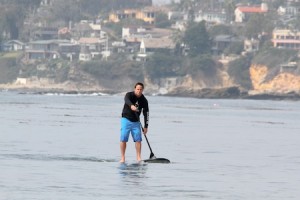
Testimony about potential hazards due to the surge of companies offering stand-up paddling lessons on local beaches prompted the City Council on Tuesday to approve developing an ordinance covering safety, insurance and liability rules related to companies providing instruction for the sport, sidestepping a call to also ban mobile operators.
Complaints stemming from the impacts of a proliferation of lessons offered on public beaches provoked Mayor Pro Tem Elizabeth Pearson and Council Member Toni Iseman to place the item on the agenda.
City staff has been actively monitoring the sport for a couple of summers, Community Services Director Ben Siegel told the council, attesting to its “explosive” growth as a recreational activity on city beaches.
Most complaints originated from Diver’s Cove, Boat Canyon and the beaches around the Montage, and that the increase in SUP instruction had also impacted neighborhood parking and resulted in some code violations on the beaches, Siegel said.
Marine Safety Chief Kevin Snow agreed that the “proliferation of people attempting to start businesses [in SUP instruction] is an issue.”
“I think the time has come for the city to nip the potential problem in the bud,” said La Vida Laguna’s Billy Fried, who first suggested restricting permitted commercial lessons to those who operate a local retail store in letter to the council co-signed by SUP Company’s Tommy Donnelly, Laguna Surf & Sport’s Jason Watson and Costa Azul’s Rod Greenup. He expressed that view again Tuesday.
The council should consider the fairness of retail businesses like his, which pay rent and taxes, having to compete with mobile operators who don’t have similar overhead expenses, Fried said.
While the city attorney said such a restriction could invite litigation, Fried said there were precedents for the same kind of regulation in other coastal cities, including La Jolla.
But whatever form the regulation takes, Fried emphasized that, “safety is our major concern.”
The popularity of SUP instruction creates a strain on lifeguards, who, if bathers are present, must clear the water for a paddler’s exit and entry whether the paddler is on their own or participating in a group lesson, Siegel and Snow said in their staff report. They also pointed out that lifeguards may have to assist some paddlers through the surf line, helping them to stay clear of hazardous areas, which can be very time-consuming when there are a lot of paddlers on the beach simultaneously and which diverts the lifeguards’ attention from their other safety responsibilities.
“Everyone has a right to the beach,” said resident and paddle boarder Teddy Wong, who said he had purchased boards and services from local retailers as well as receiving instruction from mobile-based companies. He disagreed with the proposal to restrict operators as a solution to overcrowding. “I’m here to persuade the business community to work together,” he said.
La Vida Laguna’s president Mark Dick spoke in favor of regulating instructors, saying that with such low barriers to market entry, the number of paddlers in the water will soon reach a critical mass.
Taylor Chaput, owner of Paddle Board Bliss, one of the mobile operators that works with local hotels, said she has been teaching in Laguna for three years. Rather than barring any business from the beaches, she proposed the companies “work in harmony and peace” to avoid overcrowding. Chaput, who carries business insurance, professed a willingness to enhance safety and already maintains a five to one teaching ratio with instructors certified in CPR.
Council members Bob Whalen and Steve Dicterow, along with Mayor Kelly Boyd, expressed reservations about overregulation, but saw the importance of ensuring safety and of indemnifying the city from potential liability.
In a unanimous vote, the council agreed to ask the Planning Commission to begin crafting an ordinance primarily focused on safety concerns and insurance and liability issues, with the added stipulation proposed by Council Member Toni Iseman that commercial instructors be required to wear some form of visible identification so as to be easily recognized by lifeguards.





I hope that this does not lead to collusion.
How hard is it for a mobil vendor to say he is teaching is friends. Then there is nothing the city can do. If you become to restrictive or ban them that is exactly what they will do. A better option is to make them get a city business license require insurance, give them rules to follow and make them pay taxes like everyone else. The areguments of too much work for the lifeguards is just plane crazy. We do not want to be the example of what not to do. If we restrict too much we will end up in court loosing and will have not control over what happens after that.